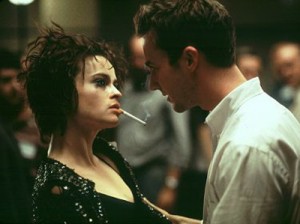[rewind] fight club
“This is your life, and it’s ending one minute at a time.”
Fight Club, directed by David Fincher, explores modern life, modern masculinity, and the influence of consumerism and marketing. At the beginning of the film we are introduced to an unnamed “every man” (Edward Norton) who, for the purposes of this review, I shall call Jack. To all appearances, he appears to have everything; a well-paid job, beautiful condo and money; however he is unfulfilled and troubled by this seemingly ideal life. After his condo is burnt down, he meets up (and later lives with) Tyler Durden (Brad Pitt), a soap salesman. That night, Durden insists Jack hits him, which he does, leading to a fight between the two. Over the coming weeks they have more fights, eventually attracting a group of men, until one day another man puts his hand up and asks; “Can I go next?” and Fight Club is born, and moves into the basement of a local bar. The rules of Fight Club are simple; two men step into the ring (no shoes, no shirt) and bare fist fight until one of them passes out, cries stop or taps out. Soon there are Fight Clubs happening every night of the week, and Durden’s goals become more anarchic and destructive, with an aim to disrupt and possibly even destroy society.
The primary theme of Fight Club is its exploration of consumerist culture, and the effect it has had on modern masculinity, and society in general. Advertising, movies, television; they all tell us how to live our lives. Tyler Durden lives on the outskirts of town, in a dilapidated house. He has none of the trappings or comforts of modern living, and yet he is still happy. He also does not have a steady job, instead working several odd jobs, which goes against what is considered normal, or a measure of success. He is aware that society has come to judge people not by who they are, but by what they own. Jack explains at one point that he was almost “complete” in his acquisition of goods, and Durden insists, “Fuck off with your sofa units and strine green stripe patterns, I say never be complete, I say stop being perfect…”
Secondary to this, Fight Club also examines the feminization of society, and the effect this has on men. It portrays men as searching for identity in the modern world, a way to redefine their masculinity. David Fincher is quoted as saying, “We’re designed to be hunters and we’re in a society of shopping. There’s nothing to kill anymore, there’s nothing to fight, nothing to overcome, nothing to explore. In that societal emasculation this everyman [the narrator] is created” The film however is not derogatory towards women, in fact women are barely mentioned, let alone specifically blamed as the cause of this change in societal values. So easily this film could have been become offensive towards women, and somehow manages to avoid this, an admirable achievement.
The violence in the film is quite graphic and realistic; and is a symbol of the characters’ desire to gain control over their lives, and also to feel something, in a world that has left them numb. The overbearing rules that govern society have driven these men to the edge, and so they feel the need to express it, albeit violently. The director is careful not to make the violence gratuitous, to ensure it illustrates his point rather than falling into mindless gore.
This is a male dominated film; with only a single female character; Marla Singer, played by Helena Bonham Carter. Jack meets Marla at a support group for victims of testicular cancer (which neither of them suffer from). Jack attends these meetings after his doctor recommends he goes, to “see real suffering”, when he complains about his insomnia. Later in the film Marla become Durden’s lover; causing conflict between him and Jack. Bonham Carter is perfect as the damaged Marla. This is the kind of role she was born to play; tough, clever, funny, sexy and just a little bit strange. Marla is not helpless, despite her low status in society, nor is she desperate. Bonham Carter brings a great deal of strength and gravitas to the role; allowing her to transcend the “love interest” cliché.
When it comes down to it, what sold me the first time I saw this movie, was the ending. It is honestly my favourite film ending ever. Naturally I won’t divulge it because I hate spoilers, but I will say that it is beautifully shot, poignant, sweet and explosive.
P.S. The best part of watching Flight Club is seeing it the second time round. Trust me.
Image Credit (1)


